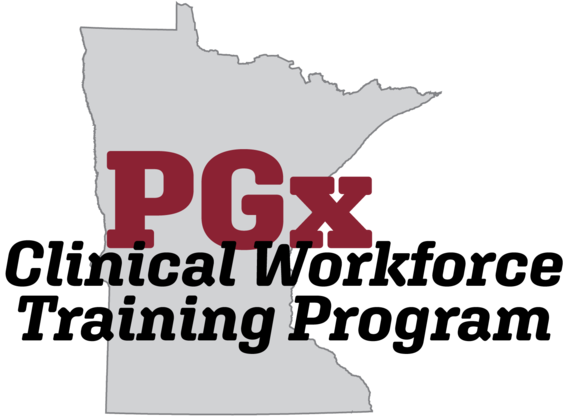
The University of Minnesota College of Pharmacy now offers a pharmacogenomics (PGx) training program designed for Minnesota's practicing pharmacists.
Build your skills in PGx, set yourself apart, and bring the benefits of a cutting-edge science to your practice and your community.
As a profession, pharmacy is at the beginning stages of readying its current workforce for PGx-guided healthcare. PGx is not yet used clinically in most healthcare organizations, especially in rural areas and those primarily caring for underserved groups. However, taking on the challenge of advanced training while working full-time can be costly and—for pharmacists not in the metro or SE regions of the state—can mean traveling great distances to reach educational opportunities.
To fully and equitably realize the benefits of PGx, all of Minnesota's current pharmacists need access to top-quality PGx training. The University of Minnesota College of Pharmacy has created the PGx Clinical Workforce Training Program to help answer that need. This program is supported by a workforce education grant from the Minnesota Department of Health's Office of Rural Health and Primary Care. Accepted trainees will be reimbursed for their time and compensated for travel costs, conference registration, and CE fees.
Program Components
What are the components of the program?
The PGx Clinical Workforce Training Program consists of three parts, which take about nine months to complete:
- A 16-week, self-paced online didactic course in PGx
- An 8-hour case-based training workshop at the University of Minnesota
- A 2-day national PGx conference at the University of Minnesota

This is a competitive program with limited enrollment. The program will also be offered in 2022 and 2023.
Faculty
Who Should Apply
Who is this training program for?
- Those interested in improving health equity in Minnesota by advancing clinical PGx.
- Those who have not been in pharmacy school recently, or who did not cover PGx in their pharmacy training.
- Those who face challenges in accessing existing PGx expertise and training opportunities.
- Those who can devote sufficient time and effort for approximately nine months to learning about PGx-guided healthcare.
Benefits of Training
There are many benefits to this training:
- You will be taught by some of the nation's top PGx experts.
- You will gain clinically applicable knowledge in a cutting-edge field.
- Trainees will be reimbursed for their time and compensated for travel costs, conference registration, and CE fees.
- Those who complete all three components of the training will receive a certificate of participation from the University of Minnesota.
Program Learning Objectives
After completing the program, trainees will be able to:
- Understand basic genetics tailored to the clinician
- Identify how/where to access clinical PGx guidelines
- Read/interpret PGx test results, and know when and how to apply results in patient care
- Understand how difference in genetic variability across ancestry groups applies to PGx
- Assess PGx testing assays and be able to select the test panel relevant for a patient population
- Understand the limitations of PGx testing
- Understand how drug-drug interactions may be altered in severity by genetic variability and know how to modify therapy
- Describe cost of PGx testing and current reimbursement issues
- Demonstrate how to document PGx results and implications, and how to explain PGx results and implications of the information to patients
- Understand the ethical, legal, and social issues in handling of PGx data
- Demonstrate how to orally communicate PGx to other healthcare providers
Eligibility
Who is eligible to apply for the program?
Applicants must be:
- Licensed pharmacists
- Practicing in Minnesota’s rural and/or underserved communities and populations
Applicants may not be currently enrolled in any postgraduate training program.
General questions? Email pgxworkforce@umn.edu.